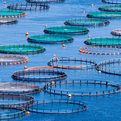Blockchain's Impact on Shrimp Farming: Unlocking Transparency and Efficiency
Blockchain technology has been hailed as a transformative force across various sectors, and its potential in agriculture, including shrimp farming, is significant. By introducing transparency, accountability, and efficiency into the shrimp farming supply chain, blockchain stands poised to tackle longstanding challenges and reshape the industry's landscape.
In this article, we delve into the potential of blockchain in shrimp farming and explore its far-reaching impact on different facets of the sector.
Challenges in Shrimp Farming
Shrimp farming, a cornerstone of the global food industry, grapples with an array of hurdles ranging from disease outbreaks to supply chain opacity. These challenges erode consumer trust and demand, undermining the industry's sustainability and profitability.
Blockchain's Potential in Shrimp Farming
Blockchain technology offers a solution by establishing a secure, transparent, and traceable supply chain ecosystem for shrimp farming. Through real-time monitoring and data recording, blockchain enables stakeholders to track every phase of the shrimp production process, from hatchery to consumer plate. This heightened visibility empowers farmers to swiftly identify and rectify issues, elevating shrimp quality and mitigating disease risks.
Advantages of Blockchain in Shrimp Farming
- Transparency Enhancement: Blockchain fosters transparency by creating a decentralized database accessible to all supply chain participants, including consumers and regulators. This transparency rebuilds consumer confidence and fuels demand for farmed shrimp.
- Origin Tracking: Blockchain enables seamless tracing of shrimp origins back to the hatchery, curtailing fraud and mislabeling. Consumers gain assurance in product authenticity while holding producers accountable for ethical practices.
- Efficiency Boost: By streamlining the supply chain and circumventing intermediaries, blockchain drives cost reduction and profit optimization for shrimp farmers. The removal of bottlenecks enhances operational efficiency and agility across the entire shrimp farming ecosystem.
- Sustainability Integration: Blockchain's transparent record-keeping aids in monitoring and achieving sustainability goals in shrimp farming. It ensures adherence to environmental regulations and promotes responsible practices, addressing concerns over habitat destruction and pollution.
Blockchain Technology as a Game-Changer
In conclusion, blockchain technology emerges as a game-changer for the shrimp farming industry, ushering in an era of transparency, accountability, and efficiency. By enhancing product quality, rebuilding consumer trust, and advancing sustainability objectives, blockchain paves the way for a resilient and thriving shrimp farming ecosystem.
As adoption proliferates and technology evolves, the transformative impact of blockchain on shrimp farming is poised to catalyze profound industry-wide changes, ensuring a sustainable and prosperous future for all stakeholders involved.
Recommended for you
Advancing Aquaculture Through Biomass Estimation: Methods and Considerations
Riley Sinclair (Digital Aqua Bear)
Expat Parenting: Raising Kids in a New Culture and Language
Lifestyle Bear
1 Day in Thailand: How Much Money Do I Need?
Dr. Theodore (Professor Bear)
Top 10 Most Popular Shopping Malls in Bangkok
Rowan (Guinness Bear)















